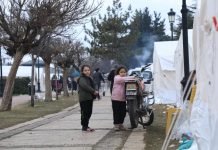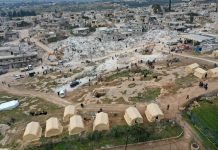There is an immense need to support the millions of survivors living in shelters, camps and rural settlements in Turkey and Syria in the aftermath of devastating earthquakes that struck Turkey in early February, Project HOPE said in press release on Wednesday.
According to Project HOPE teams deployed in the earthquake-affected region, lice, scabies and diarrhea are the top medical conditions, while unsanitary and cramped conditions continue to increase the risk of the spread of contagious diseases.
“While thousands of survivors are now living in formal, government-run camps in urban centers of the affected areas, many more are living in informal camps that are closer to their homes and neighborhoods,” said Arlan Fuller, Project HOPE’s director of emergency response and preparedness. “Informal camps – many of which are made up of minority groups of Syrian refugees, Romani, and Kurdish families – are showing the greatest need, which includes housing, latrines, showers, and mental health and psychosocial support.”
A 7.8-magnitude earthquake that struck near the Turkish city of Gaziantep – home to around 2 million people and on the border with Syria – as people were sleeping on February 6 was followed by dozens of aftershocks, including a 7.5-magnitude temblor that jolted the region in the middle of search and rescue efforts the same day.
The massive loss of life has had a profound impact on the community’s mental health, Project HOPE said.
The UN launched a $1 billion funding appeal to support millions of people in Turkey.
UN Secretary-General Antonio Guterres earlier said in a statement that the funds would provide humanitarian relief for three months to 5.2 million people. The money would “allow aid organizations to rapidly scale up vital support,” including in the areas of food security, protection, education, water and shelter, he added.
UN humanitarian agencies will need $397.6 million in funding over the next three months to respond to the most pressing humanitarian needs of 4.9 million people in Syria who have been affected by the quakes, the Office for the Coordination of Humanitarian Affairs (OCHA) said in a statement.
Founded in 1958, Project HOPE is a leading global health and humanitarian organization operating in more than 25 countries around the world.














